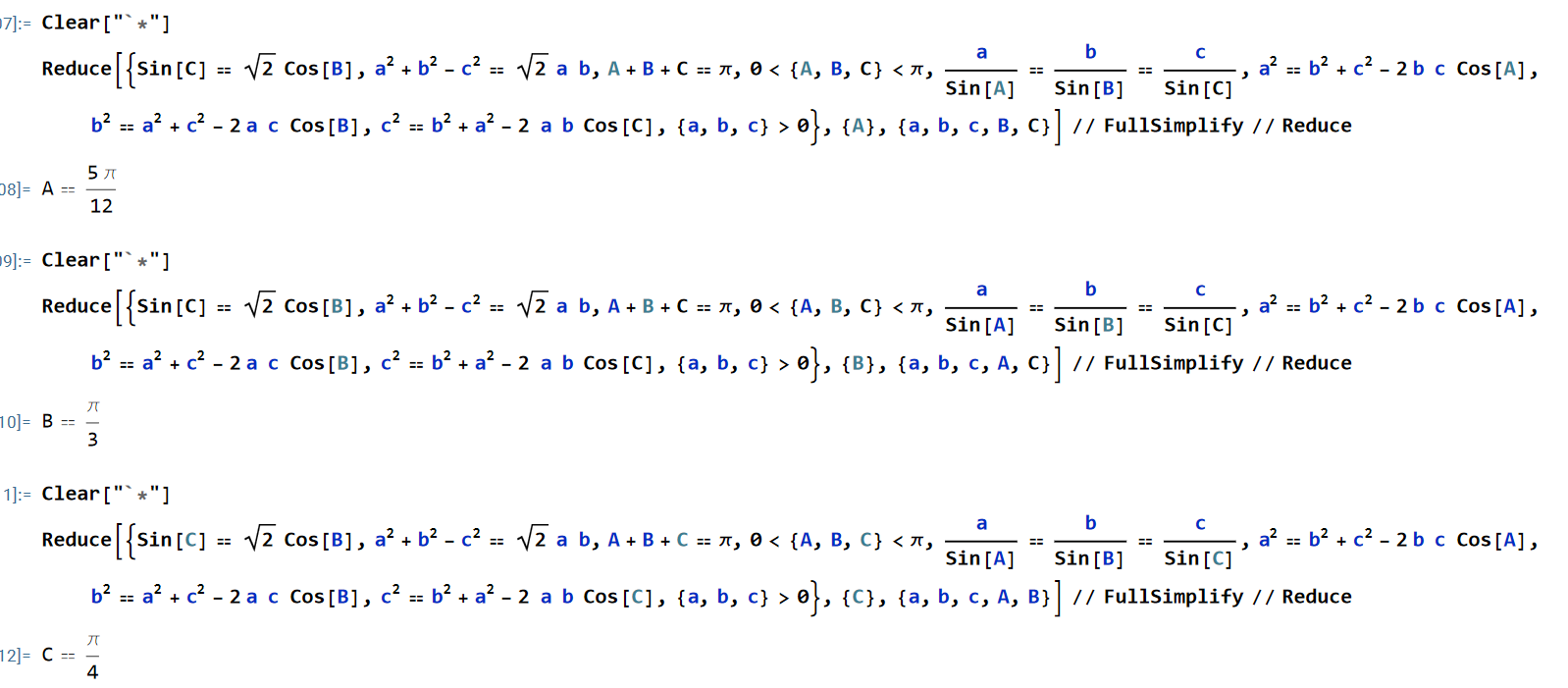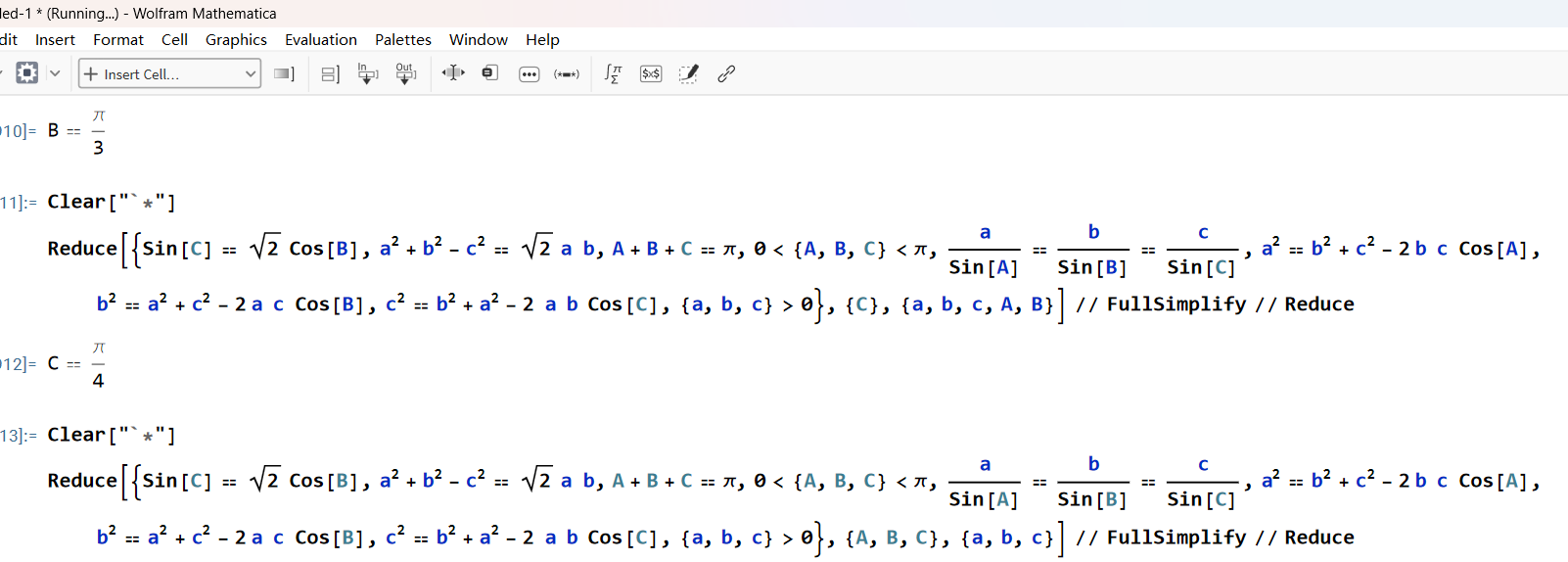Clear["`*"]
Reduce[{Sin[C] == Sqrt[2] Cos[B], a^2 + b^2 - c^2 == Sqrt[2] a b,
A + B + C == \[Pi], 0 < B < \[Pi], a/Sin[A] == b/Sin[B] == c/Sin[C],
a^2 == b^2 + c^2 - 2 b c Cos[A],
b^2 == a^2 + c^2 - 2 a c Cos[B],
c^2 == b^2 + a^2 - 2 a b Cos[C], {a, b, c} > 0}, {A, B, C}, {a,
b, c}]
The software kept showing "running" without producing a result when solving this equation. However, the values of these three angles can be computed manually.
An alternative approach can be used to find the values of these three angles.
Clear["`*"]
Reduce[{Sin[C] == Sqrt[2] Cos[B], Cos[C] == 1/Sqrt[2],
A + B + C == \[Pi], 0 < {A, B, C} < \[Pi]}, {A, B, C}] //
FullSimplify // Reduce
Manually substituting a known condition involving the relationship of sides using the cosine rule to obtain the cosine value of angle C.
But my question is, how can the software be enabled to quickly produce results while keeping the equation in the first code unchanged?
The strange thing is that, while keeping the equation unchanged, the software can solve for each of the three angles individually every time.
Clear["`*"]
Reduce[{Sin[C] == Sqrt[2] Cos[B], a^2 + b^2 - c^2 == Sqrt[2] a b,
A + B + C == \[Pi], 0 < {A, B, C} < \[Pi],
a/Sin[A] == b/Sin[B] == c/Sin[C],
a^2 == b^2 + c^2 - 2 b c Cos[A],
b^2 == a^2 + c^2 - 2 a c Cos[B],
c^2 == b^2 + a^2 - 2 a b Cos[C], {a, b, c} > 0}, {A}, {a, b, c,
B, C}] // FullSimplify // Reduce
A == (5 \[Pi])/12
Clear["`*"]
Reduce[{Sin[C] == Sqrt[2] Cos[B], a^2 + b^2 - c^2 == Sqrt[2] a b,
A + B + C == \[Pi], 0 < {A, B, C} < \[Pi],
a/Sin[A] == b/Sin[B] == c/Sin[C],
a^2 == b^2 + c^2 - 2 b c Cos[A],
b^2 == a^2 + c^2 - 2 a c Cos[B],
c^2 == b^2 + a^2 - 2 a b Cos[C], {a, b, c} > 0}, {B}, {a, b, c,
A, C}] // FullSimplify // Reduce
B == \[Pi]/3
Clear["`*"]
Reduce[{Sin[C] == Sqrt[2] Cos[B], a^2 + b^2 - c^2 == Sqrt[2] a b,
A + B + C == \[Pi], 0 < {A, B, C} < \[Pi],
a/Sin[A] == b/Sin[B] == c/Sin[C],
a^2 == b^2 + c^2 - 2 b c Cos[A],
b^2 == a^2 + c^2 - 2 a c Cos[B],
c^2 == b^2 + a^2 - 2 a b Cos[C], {a, b, c} > 0}, {C}, {a, b, c,
A, B}] // FullSimplify // Reduce
C == \[Pi]/4
——————————————————————————————————————
However, when attempting to compute the values of all three angles A, B, and C simultaneously, the software keeps displaying "running" without producing a result.
————————————————————————————————————
Unable to decide whether numeric quantity -Pi + <<2>> - I (Log[1 - I
(Divide[-3 Power[2, <<1>>], (1 - Power[Root[{<<2>>}, {2, 3}], 2])
<<2>>] + <<124>>)] - Log[1 + <<1>>]) is equal to zero. Assuming it is.





Solve[{ Sin[C] == Sqrt[2] Cos[B], a^2 + b^2 - c^2 == Sqrt[2] a b, A + B + C == \[Pi], 0 < {A, B, C} < \[Pi], a/Sin[A] == b/Sin[B] == c/Sin[C], a^2 == b^2 + c^2 - 2 b c Cos[A], b^2 == a^2 + c^2 - 2 a c Cos[B], c^2 == a^2 + b^2 - 2 a b Cos[C], {a, b, c} > 0}, {A, B, C, a, b, c}] // FullSimplify // AbsoluteTiming(-1) $\endgroup$AssumptionsorAssumingeven if they've appeared in the body of your questions so many times: mathematica.stackexchange.com/q/282329/1871 mathematica.stackexchange.com/q/284016/1871 mathematica.stackexchange.com/q/289061/1871 mathematica.stackexchange.com/q/292627/1871 mathematica.stackexchange.com/q/282362/1871 mathematica.stackexchange.com/q/284179/1871 mathematica.stackexchange.com/q/283938/1871 Once again, I don't see your effort. Sadly I cannot cast a second downvote. $\endgroup$